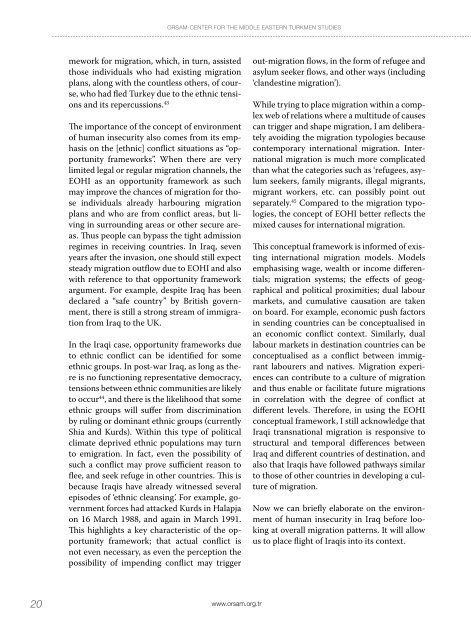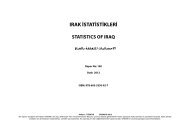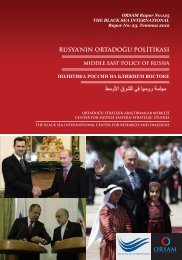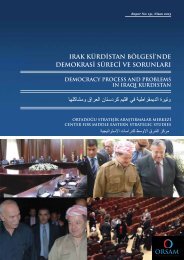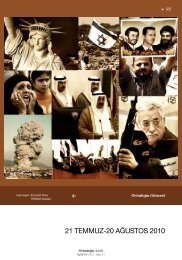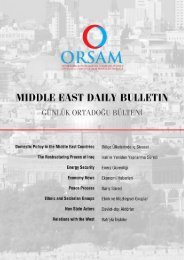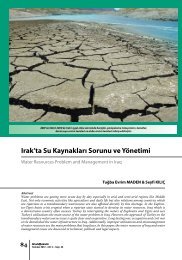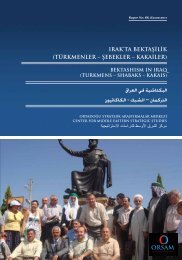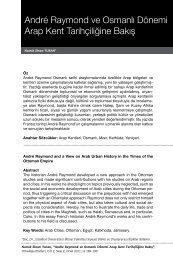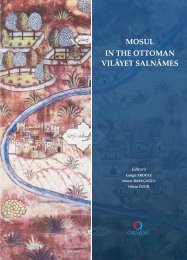turkmen in iraq and their flight - orsam
turkmen in iraq and their flight - orsam
turkmen in iraq and their flight - orsam
Create successful ePaper yourself
Turn your PDF publications into a flip-book with our unique Google optimized e-Paper software.
ORSAM-CENTER FOR THE MIDDLE EASTERN TURKMEN STUDIES<br />
mework for migration, which, <strong>in</strong> turn, assisted<br />
those <strong>in</strong>dividuals who had exist<strong>in</strong>g migration<br />
plans, along with the countless others, of course,<br />
who had fled Turkey due to the ethnic tensions<br />
<strong>and</strong> its repercussions. 43<br />
The importance of the concept of environment<br />
of human <strong>in</strong>security also comes from its emphasis<br />
on the [ethnic] conflict situations as “opportunity<br />
frameworks”. When there are very<br />
limited legal or regular migration channels, the<br />
EOHI as an opportunity framework as such<br />
may improve the chances of migration for those<br />
<strong>in</strong>dividuals already harbour<strong>in</strong>g migration<br />
plans <strong>and</strong> who are from conflict areas, but liv<strong>in</strong>g<br />
<strong>in</strong> surround<strong>in</strong>g areas or other secure areas.<br />
Thus people can bypass the tight admission<br />
regimes <strong>in</strong> receiv<strong>in</strong>g countries. In Iraq, seven<br />
years after the <strong>in</strong>vasion, one should still expect<br />
steady migration outflow due to EOHI <strong>and</strong> also<br />
with reference to that opportunity framework<br />
argument. For example, despite Iraq has been<br />
declared a “safe country” by British government,<br />
there is still a strong stream of immigration<br />
from Iraq to the UK.<br />
In the Iraqi case, opportunity frameworks due<br />
to ethnic conflict can be identified for some<br />
ethnic groups. In post-war Iraq, as long as there<br />
is no function<strong>in</strong>g representative democracy,<br />
tensions between ethnic communities are likely<br />
to occur 44 , <strong>and</strong> there is the likelihood that some<br />
ethnic groups will suffer from discrim<strong>in</strong>ation<br />
by rul<strong>in</strong>g or dom<strong>in</strong>ant ethnic groups (currently<br />
Shia <strong>and</strong> Kurds). With<strong>in</strong> this type of political<br />
climate deprived ethnic populations may turn<br />
to emigration. In fact, even the possibility of<br />
such a conflict may prove sufficient reason to<br />
flee, <strong>and</strong> seek refuge <strong>in</strong> other countries. This is<br />
because Iraqis have already witnessed several<br />
episodes of ‘ethnic cleans<strong>in</strong>g’. For example, government<br />
forces had attacked Kurds <strong>in</strong> Halapja<br />
on 16 March 1988, <strong>and</strong> aga<strong>in</strong> <strong>in</strong> March 1991.<br />
This highlights a key characteristic of the opportunity<br />
framework; that actual conflict is<br />
not even necessary, as even the perception the<br />
possibility of impend<strong>in</strong>g conflict may trigger<br />
out-migration flows, <strong>in</strong> the form of refugee <strong>and</strong><br />
asylum seeker flows, <strong>and</strong> other ways (<strong>in</strong>clud<strong>in</strong>g<br />
‘cl<strong>and</strong>est<strong>in</strong>e migration’).<br />
While try<strong>in</strong>g to place migration with<strong>in</strong> a complex<br />
web of relations where a multitude of causes<br />
can trigger <strong>and</strong> shape migration, I am deliberately<br />
avoid<strong>in</strong>g the migration typologies because<br />
contemporary <strong>in</strong>ternational migration. International<br />
migration is much more complicated<br />
than what the categories such as ‘refugees, asylum<br />
seekers, family migrants, illegal migrants,<br />
migrant workers, etc. can possibly po<strong>in</strong>t out<br />
separately. 45 Compared to the migration typologies,<br />
the concept of EOHI better reflects the<br />
mixed causes for <strong>in</strong>ternational migration.<br />
This conceptual framework is <strong>in</strong>formed of exist<strong>in</strong>g<br />
<strong>in</strong>ternational migration models. Models<br />
emphasis<strong>in</strong>g wage, wealth or <strong>in</strong>come differentials;<br />
migration systems; the effects of geographical<br />
<strong>and</strong> political proximities; dual labour<br />
markets, <strong>and</strong> cumulative causation are taken<br />
on board. For example, economic push factors<br />
<strong>in</strong> send<strong>in</strong>g countries can be conceptualised <strong>in</strong><br />
an economic conflict context. Similarly, dual<br />
labour markets <strong>in</strong> dest<strong>in</strong>ation countries can be<br />
conceptualised as a conflict between immigrant<br />
labourers <strong>and</strong> natives. Migration experiences<br />
can contribute to a culture of migration<br />
<strong>and</strong> thus enable or facilitate future migrations<br />
<strong>in</strong> correlation with the degree of conflict at<br />
different levels. Therefore, <strong>in</strong> us<strong>in</strong>g the EOHI<br />
conceptual framework, I still acknowledge that<br />
Iraqi transnational migration is responsive to<br />
structural <strong>and</strong> temporal differences between<br />
Iraq <strong>and</strong> different countries of dest<strong>in</strong>ation, <strong>and</strong><br />
also that Iraqis have followed pathways similar<br />
to those of other countries <strong>in</strong> develop<strong>in</strong>g a culture<br />
of migration.<br />
Now we can briefly elaborate on the environment<br />
of human <strong>in</strong>security <strong>in</strong> Iraq before look<strong>in</strong>g<br />
at overall migration patterns. It will allow<br />
us to place <strong>flight</strong> of Iraqis <strong>in</strong>to its context.<br />
20<br />
www.<strong>orsam</strong>.org.tr


